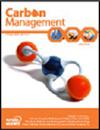China’s pathways of CO2 capture, utilization and storage under carbon neutrality vision 2060
IF 3.2
4区 环境科学与生态学
Q3 ENVIRONMENTAL SCIENCES
引用次数: 13
Abstract
Abstract Carbon dioxide (CO2) Capture, Utilization and Storage (CCUS) is an indispensable part of the carbon removal technologies to achieve carbon neutrality for China. Our study focuses on China’s CCUS pathways, and draws out three key conclusions: (1) in terms of the greenhouse gases emission reductions required to achieve carbon neutrality and based on current technology projections, the CO2 emission reductions to be achieved by CCUS are 0.6 ∼ 1.4 billion tonnes and 1 ∼ 1.8 billion tonnes in 2050 and 2060, respectively; (2) from the perspective of source-sink matching in China, the emission reduction potential provided by CCUS can basically meet the demand of carbon neutrality target (0.6 ∼ 2.1 billion tonnes of CO2); (3) with the development of technologies, the cost of CCUS in China has a great potential to be reduced in the future. It is expected that by 2030, the technical cost of the whole CCUS process (according to 250 kilometers transportation) in China will be 310 ∼ 770 Chinese Yuan per tonne of CO2, and by 2060, it will gradually drop to 140 ∼ 410 Chinese Yuan per tonne of CO2.碳中和愿景下的中国二氧化碳捕获、利用和储存途径
摘要二氧化碳捕获、利用和储存(CCUS)是我国实现碳中和除碳技术中不可或缺的一部分。我们的研究重点关注中国的CCUS途径,并得出三个关键结论:(1)就实现碳中和所需的温室气体减排而言,根据目前的技术预测,CCUS将实现的CO2减排为0.6 ∼ 14亿吨和1 ∼ 2050年和2060年分别为18亿吨;(2) 从中国的源链匹配角度看,CCUS提供的减排潜力基本能够满足碳中和目标(0.6 ∼ 21亿吨二氧化碳);(3) 随着技术的发展,中国CCUS的成本在未来有很大的降低潜力。预计到2030年,中国CCUS全过程(按250公里运输)的技术成本将为310 ∼ 每吨二氧化碳770元,到2060年,将逐渐降至140元 ∼ 每吨二氧化碳410元人民币。
本文章由计算机程序翻译,如有差异,请以英文原文为准。
求助全文
约1分钟内获得全文
求助全文
来源期刊

Carbon Management
ENVIRONMENTAL SCIENCES-
CiteScore
5.80
自引率
3.20%
发文量
35
期刊介绍:
Carbon Management is a scholarly peer-reviewed forum for insights from the diverse array of disciplines that enhance our understanding of carbon dioxide and other GHG interactions – from biology, ecology, chemistry and engineering to law, policy, economics and sociology.
The core aim of Carbon Management is it to examine the options and mechanisms for mitigating the causes and impacts of climate change, which includes mechanisms for reducing emissions and enhancing the removal of GHGs from the atmosphere, as well as metrics used to measure performance of options and mechanisms resulting from international treaties, domestic policies, local regulations, environmental markets, technologies, industrial efforts and consumer choices.
One key aim of the journal is to catalyse intellectual debate in an inclusive and scientific manner on the practical work of policy implementation related to the long-term effort of managing our global GHG emissions and impacts. Decisions made in the near future will have profound impacts on the global climate and biosphere. Carbon Management delivers research findings in an accessible format to inform decisions in the fields of research, education, management and environmental policy.
 求助内容:
求助内容: 应助结果提醒方式:
应助结果提醒方式:


